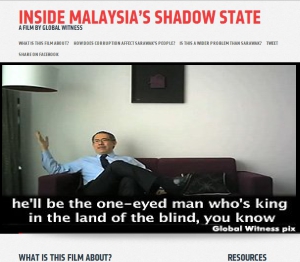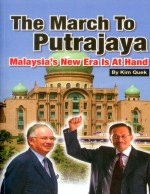 Billions of ringgit in investments are in the pipeline from Abu Dhabi, and is set to flow into two major projects in Kuala Lumpur and Sarawak, says Prime Minister Najib Razak. The emirate’s investment unit, Mubadala Development Co (Mubadala), is teaming up with the Government-owned 1Malaysia Development Bhd to participate in these property and aluminium ventures.
Billions of ringgit in investments are in the pipeline from Abu Dhabi, and is set to flow into two major projects in Kuala Lumpur and Sarawak, says Prime Minister Najib Razak. The emirate’s investment unit, Mubadala Development Co (Mubadala), is teaming up with the Government-owned 1Malaysia Development Bhd to participate in these property and aluminium ventures.
At the signing of the two separate collaboration agreements on Friday, Najib said the first would pave the way for Mudabala’s involvement in the Kuala Lumpur International Financial District (KLIFD) real estate development, which was estimated to cost more than RM26bil.
In the second tie-up, Najib added, Mudabala, through Mudabala Industry, was looking to commit up to US$7bil (RM21.7bil) in long-term projects in the Sarawak Corridor of Renewable Energy (SCORE).
“We are happy that 1MDB and Mudabala see each other as partners in driving strategic initiatives for the long-term sustainable economic development of their respective countries. Indeed, there is much that we share and can gain from each other,” he said.
 Mudabala Real Estate and Hospitality (MREH) has agreed to work with 1MDB to explore the potential joint development of key strategic projects within the 34ha KLIFD, near Jalan Tun Razak.
Mudabala Real Estate and Hospitality (MREH) has agreed to work with 1MDB to explore the potential joint development of key strategic projects within the 34ha KLIFD, near Jalan Tun Razak.
“The full scope of MREH’s participation in the projects to be located within the KLIFD will be finalised in 2011, following completion by 1MDB of the KLFID master plan,” said Mudabala and 1MDB in a joint press statement.
The KLIFD will provide a state-of-the-art home for important banking and financial entities. It is meant to further cement Malaysia’s position as a leader in global Islamic finance.
“The KLIFD is critical in the development of a dynamic, globally competitive financial sector that will promote economic growth, attract foreign direct investment and create jobs,” Najib said.
“We will invite, we will encourage and we will persuade the local and international financial community to work with us not only in shaping Kuala Lumpur as a global financial centre but also to benefit from what the KLIFD has to offer.”
Najib said the potential investment in SCORE, which is for the development of a major initiative in the aluminium sector based on hydro power, was expected to generate spill-over economic activities in multiple sectors and expected to create more than 10,000 jobs during construction and 2,000 specialist jobs.
Specific details of these projects, all of which would be led by 1MDB would be made available in due course, he added.
Mubadala and 1MDB said they were starting preliminary assessment work on the SCORE project. It has been reported that 1MDB was seeking to set up an aluminium smelter in Sarawak.
In his speech, Mubadala chief executive officer and managing director Khaldoon Khalifa Al Mubarak said Abu Dhabi viewed Malaysia as an ideal investment platform linking the emirate to this region.
“The Abu Dhabi government is very optimistic about Malaysia’s prospects as an investment destination of choice – our investment is a long-term endorsement of that view,” said Khaldoon who is also special envoy to the Crown Prince of Abu Dhabi and deputy supreme commander of the UAE Armed Forces.
 At the same event, Najib, who is also chairman of the board of advisers of 1MDB, announced that 1MDB posted a net profit of RM425mil for its first financial year ended March 31. – Star
At the same event, Najib, who is also chairman of the board of advisers of 1MDB, announced that 1MDB posted a net profit of RM425mil for its first financial year ended March 31. – Star
Malaysia Chronicle appends below an interview Jho Low gave to the Star on July 30, 2010 where he talks about how he helped set up Trengganu Investment Authority later became 1MDB.
Low dispels talk he received RM500mil airbase job
KUALA LUMPUR: Well-connected businessman Jho Low has dispelled talk that he is involved in the redevelopment of the TUDM Sungai Besi airbase.
“I am not involved – that part I want to make clear. I understand that there are some allegations that I received a RM500mil contract for the Sungai Besi project. That is absolutely not true. I have no involvement whatsoever in the Sungai Besi project and from what I was made to understand, it is a project by 1MDB,” he said in an exclusive interview.
Low also spoke extensively about Middle East investments in Malaysia and what the country needed to do to get more Arabs to invest here.
A: Tun Dr Mahathir Mohamad had great vision when he was Prime Minister with a lot of money that was spent building Malaysian infrastructure which also resulted in Malaysian-based construction companies that have gone on to be leaders in the global construction arena.
There are now many Malaysian companies doing sophisticated construction work in Abu Dhabi, Qatar and all over the Middle East. Overall, Malaysian companies have gained a good reputation there.
A: My first was actually the Iskandar Development Region investment. A friend from Khazanah called me and mentioned that they were looking to invite some Middle Eastern investors to be the core investors and asked if I knew of potential blue-chip investors.
So that is where it started. Eventually, both Mubadala and Kuwait Finance House’s USD1.2bil entry into Iskandar was a big boost for Malaysia.
They have shown their commitment as long-term investors and it is my view that Khazanah and Iskandar Investment Bhd have done a good job.
I have heard some arguments that projects in Iskandar are behind schedule. However, I have been told by a lot of major Middle Eastern developers that it is very important that large development projects are sustainable in the long term. It is better to take your time to be prudent with careful planning and proper execution as opposed to a rush job.
The Iskandar project so far has paced itself well as a long-term project, and the critics sometimes need to appreciate the fact that the objectives of Iskandar is to achieve long-term sustainability.
A: I had also been asked by the previous chairman of Abu Dhabi Commercial Bank (ADCB) for my input and opinion on RHB Bhd and its potential which I was very bullish on for the long-term. ADCB eventually invested a significant amount in the Malaysian bank. That is one of the key investments Abu Dhabi made in Malaysia which continues to show that Abu Dhabi is investing in Malaysia for the long-term.
A: I was involved in the setting up of TIA from January 2009 to mid-May 2009. The Yang di-Pertuan Agong Sultan Mizan (Zainal Abidin) was kind enough to ask me to assist, given my relationship with the Middle East and insight I had on how they had set up their sovereign wealth funds.
In addition to me, there was an important committee comprising key Malaysians such as Tan Sri Azlan Zainol amongst others, who provided important guidance. There was also input from blue-chip foreign consultants and advisers.
Subsequently, as I understand from news reports, TIA was federalised to become 1MDB. I don’t play any role in 1MDB, and I did not get compensated by 1MDB or any other government-owned entities although some blogs have mentioned that I did. That is untrue.
However, I do from time to time speak to friends in Khazanah and 1MDB to get their input and ideas on how to better facilitate investments from the Middle East to Malaysia or vice-versa.
A: His Majesty’s sister Tunku Datuk Rahimah introduced us. She is the chairman of Loh & Loh Corporation Bhd, whom I met as a fellow shareholder of Abu Dhabi-Kuwait-Malaysia Investment Corporation (ADKMIC).
A: In January 2008, I was invited to participate as a shareholder of ADKMIC. The other investors included Sheikh Sabah, Yousef Al Otaiba, and few other prominent Middle East and local investors. I had a 10% share.
This private investment company was set up for investments in Malaysia, and it participated in the UBG transaction because we saw UBG as a good company in terms of growth and the construction business. Un-fortunately, the world was hit by the financial crisis and infrastructure jobs in UAE slowed down.
We subsequently received an offer from Petro Saudi and we decided to exit this investment. We were informed by Petro Saudi that they believed that companies like Loh & Loh and Putrajaya Perdana had good potential to expand in Arabian markets.
A: Prime Minister Datuk Seri Najib Tun Razak’s recent announcement on liberalisation have been tremendously helpful in building investor confidence for Malaysia. However, there are some investors who are taking a wait-and-see attitude to be convinced of actual implementation.
Previously, there had also been complaints about bureaucracy but this has improved tremendously. I have been getting good feedback from a lot of Arabs who are investing in Malaysia and thus I am bullish in the long-term on our ability to attract FDIs.
Attracting FDIs is not just about going abroad and doing roadshows to sell publicly-listed shares. The FDIs that Malaysia should be pushing hard to attract are those which clearly indicate a commitment for the long-term which result in real multiplier effects and benefits the country.
Malaysia can also be more effective in locking in FDIs by having a more streamlined, coordinated and systematic approach in which heads of states, government officials and private businesses target key investors and offer attractive investment propositions in strategic areas for Malaysia which maximises the short-term economic impact for Malaysia, but also fits the bill of sustainable development in the long-term.
It is also important that all Malaysians make the extra effort of explaining to investors about the potential of Malaysia and clarify some of the negative perceptions of our country. —- Malaysia Chronicle






















Very incredibly amazing!!! It takes this young guy to bring in the rich Arab investors. Even the Agong needs his help. It clearly shows that no Malaysian Sultan, no Malaysian Prime Minister, Khazanah and no MITI has the power and influence, nor the capability to do what Jho Low can do.
Obviously, Jho Low should be the Finance Minister or Minister of International Trade.
Comment by Peen Keening — October 16, 2010 @ 5:31 PM |
I maintained my earlier stand that Mubadala Development Company from Abu Dhabi is the offshore vehicle for Najib and Taib to milk the country through projects initiated by 1MDB and Taib Mahmud. And through 1MDB, Rosmah Mansor the PM’s wife together with Low Jho Taek who introduced Mubadala will be the commission agents. Make no mistake, Mubadala Devp Co is the main financier for UMNO in the next General Election.
Comment by Mata Kuching — October 15, 2010 @ 8:38 AM |